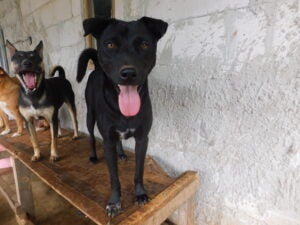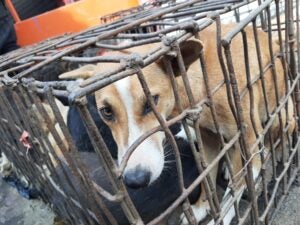
JAKARTA, Indonesia—Hollywood actress Kim Basinger, comedian Ricky Gervais and British actor Peter Egan have joined campaigners from the Dog Meat Free Indonesia coalition in celebrating news that Indonesia’s capital city of Jakarta has banned the dog and cat meat trade. The stars sent a video message after the Food Security, Marine and Agriculture Department confirmed Jakarta now becomes the 21st jurisdiction in Indonesia to ban the trade. The move comes in response to an intensive campaign by DMFI, exposing the severe animal cruelty and risks to human health from zoonotic diseases such as rabies.
Across Indonesia, more than one million dogs and countless cats are killed every year for meat, most of them stolen pets or strays, snatched from the streets and illegally trafficked on grueling journeys to supply demand hotspots. Many die during this ordeal from heatstroke, dehydration or injuries inflicted during capture and transport. Those who survive are taken to makeshift slaughterhouses where they are bludgeoned and killed in full view of other dogs. DMFI investigations suggest that in Jakarta, an estimated 9,520 dogs per month or around 340 dogs every day are killed for meat, with over 95% of dogs trafficked from West Java province where rabies remains endemic. Dog meat can be found for sale in Jakarta’s markets such as Pasar Senen, Pasae Cijantung and others, and suppliers also sell to local restaurants throughout the city.
Lola Webber, director of campaigns to End Dog Meat at Humane Society International, a DMFI member group, says: “A dog and cat meat trade ban in Indonesia’s capital city Jakarta is hugely significant, not just because of the thousands of animals killed every year for the city’s trade, but also because it recognizes that this cruel trade risks spreading rabies. Jakarta’s rabies-free status is jeopardized every day that the dog meat trade continues to traffic dogs of unknown disease status into the city. We hope the Indonesian government will take the next step of banning this awful trade for good so that no more dogs or cats have to suffer this cruelty in future.”
The prohibition was officially announced by Jakarta’s Food Security, Marine and Agriculture Department. Ibu Ir. Suharini Eliawati M.Si, Head of the Food Security and Agriculture Department for Jakarta said, “Current progress is the formation of a Food Regulation to ban the dog meat trade, and the issuance of a Governor’s Directive. The plan is also to educate people to not consume dog meat, and to be responsible animal owners.”
A representative of the Head of the DKI Jakarta Civil Service Police Unit, stated “We are very supportive and ready to help socialize this Directive to sellers and stalls that are still selling dog meat. This needs to be done so that traders have time to find alternative jobs.”
The news was celebrated by global celebrities via video messages from actress Kim Basinger, comedian Ricky Gervais and British actor Peter Egan thanking the Jakarta authorities for taking action.
Kim Basinger said: “Thank you Governor Heru for your leadership in taking this brave and tremendously powerful step to ban the cruel, dangerous and illegal dog meat trade in Jakarta. Your actions send a very clear message–dogs are not food. These laws to prohibit dog meat, will have far reaching impacts, protecting both animals and people. Dogs are a true gift to all of us on this planet. They are our companions who serve mankind loyally. They must be protected from the abusive and unimaginably cruel dog meat trade.”
Ricky Gervais said: “I’d like to add my voice to the millions of other in calling for a ban on the dog meat trade in Indonesia. The message is clear, dogs are not food.”
Peter Egan said: “Thank you Governor Heru for your great leadership and compassion in taking action to ban the dog meat trade in Jakarta. Your actions will protect animals and safeguard communities’ health and welfare. I would like to add my voice to the millions of others in calls for a ban on the dog meat trade throughout Indonesia to protect the tens of thousands of dogs each month from unimaginable cruelty and also to showcase and celebrate Indonesia’s great compassion and its natural and cultural beauty.”
Jakarta’s ban comes four years after the central government reacted to shocking investigative evidence presented by DMFI and called upon all provincial, regency and city authorities to take action to discourage dog and cat meat consumption and to implement measures to tackle the trades wherever they occur. Speaking at the National Coordination of Animal Welfare meeting in September 2018, the Director of Veterinary Public Health described the treatment of the dogs and cats as “torture for animals” and stated that “dog meat or any animal that is not registered as farm animals, is illegal (…) Foreign countries find a low standard of animal welfare and cruelty unacceptable and will stop visiting Indonesia, which is bad for tourism.”
Karin Franken, national coordinator of the DMFI coalition, welcomed the news, saying: “On behalf of the Dog Meat Free Indonesia coalition and the millions of dog and cat-loving and concerned citizens across Indonesia, I would like to express our deepest appreciation for the DKI Jakarta Food, Maritime and Fisheries Security Service for taking these progressive measures to safeguard the health and welfare of both people and animals. Jakarta’s ban sets a clear example for other jurisdictions to follow that the dog and cat meat trade is intolerably cruel and dangerous, and will help raise public awareness about the serious dangers and animal suffering inherent in this trade.”
The ban was first published by Jakarta’s Food, Maritime and Fisheries Security Service in Appeal Letter Number 4493/-1823.55 which restricts the trafficking of rabies-transmitting animals and non-food animal products, on the grounds of protecting public health. It covers what is known as the Special Area of the city of (DKI) Jakarta which is the most populous metropolitan area in Indonesia, comprising the capital as well as five satellite cities and three complete regencies, including parts of West Java and Banten provinces.
Facts:
A Nielsen opinion poll in January 2021, commissioned by DMFI, revealed that 93% of Indonesians support a national dog meat ban, and just 4.5% have ever consumed dog meat.
- The dog meat trade is now banned in 21 cities and regencies across Indonesia. The regencies are Karanganyar, Sukoharjo, Semarang, Blora, Brebes, Purbalingga, Mojokerto, Temanggung, Jepara and Magelang. The cities are Salatiga, Malang, Semarang, Magelang, Blitar, Mojokerto, Medan, Surabaya and Jakarta.
- In addition to the 21 locations in Indonesia, across Asia the trade in and slaughter, sale and consumption of dogs is also banned or otherwise ended in Taiwan, Hong Kong, the Philippines, Thailand and two major cities in mainland China. In South Korea a government-initiated task force is currently considering the issue of a ban. President Yoon Suk-yeol has stated he would not oppose a dog meat ban provided there is social consensus, and first lady Kim Keon-hee has spoken publicly of her desire for an end to dog meat consumption.
- Dog Meat Free Indonesia is a coalition of national and international animal protection organisations comprising Jakarta Animal Aid Network, Animal Friends Jogja, Humane Society International, Animals Asia and FOUR PAWS. The coalition exposes the brutality of the trades and campaigns for a ban on the grounds of animal cruelty and risks to public health.
ENDS
Media contacts:
Indonesia
- Lola Webber, Humane Society International’s director of campaigns to End Dog Meat, and DMFI coordinator: +6281337408768; Lwebber@hsi.org
- Karin Franken, Jakarta Animal Aid Network founder and national coordinator for Dog Meat Free Indonesia Coalition: +6282122487794; jaan_adopt@yahoo.com
United Kingdom
- Wendy Higgins, Humane Society International’s director of international media: whiggins@hsi.org

